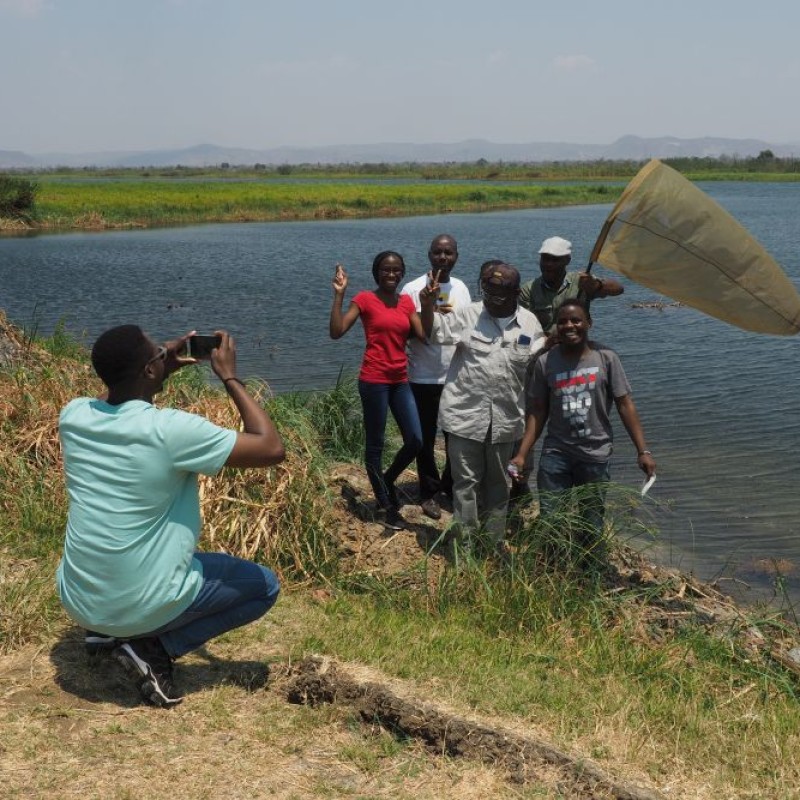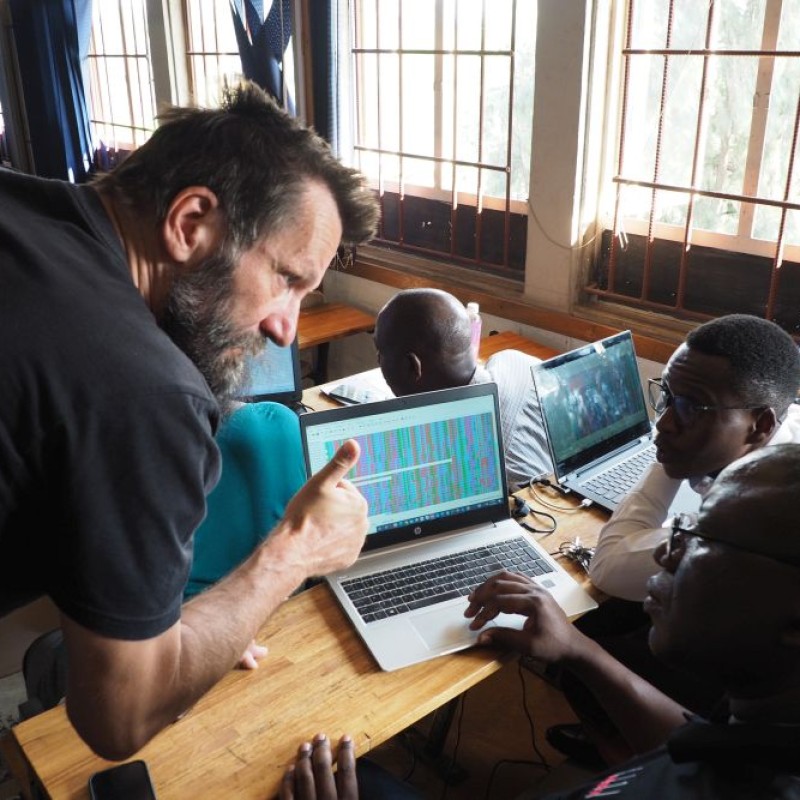Protecting biodiversity: DNA barcoding in Zambia
20. December 2022
The highest degree of biodiversity
– the variety of animals, plants and fungi – is found in tropical regions. A cooperative project entitled “DNA Barcoding of
Zambia's Biodiversity” has now been launched: experts from the Austrian Barcode of Life (ABOL) initiative, which is coordinated
by the NHM Vienna, are helping to establish a DNA barcoding programme in Zambia together with local scientists.
DNA barcoding involves the identification of animals, plants and fungi by comparing short sections of genetic material (DNA).
Opening up completely new possibilities of identifying species for researchers, this approach is now also being introduced
to tropical Africa, where biodiversity is highest and researchers partly lack the required knowledge. In the context of the
OeAD cooperation development research project “DNA Barcoding of Zambia’s Biodiversity” under the lead of the University of
Graz, a DNA barcoding workshop was held at the University of Zambia (UNZA) in Lusaka in autumn, involving experts from the
Austrian barcoding initiative ABOL, which is coordinated by NHM Vienna.
“It was our aim was to teach Zambian biologists the theoretical basics of DNA barcoding and to help them put this methodological approach to biodiversity recording into practice there,” explains Dr Nikolaus Szucsich, coordinator of the ABOL initiative at the NHM Vienna. The initiative involved not only many lectures but also a sampling trip to the Kafue River. There, equipped with nets and keen ambition, the participants set out to collect dragonflies. In the laboratory, the researchers identified the species of the collected animals and took tissue samples for DNA analysis.
Dragonflies are considered good indicator organisms for the quality of bodies of water. The test run also included fish samples, because fish are very important for the Zambian economy.
“Compared to Austria, where the main aim is to fill gaps in knowledge, the aim of the project in Zambia was to use these two animal groups as a springboard for establishing a broader survey and monitoring of the native Zambian biodiversity,” explains Dr Stephan Koblmüller from the University of Graz. Knowing the status quo of biodiversity is a prerequisite for stemming its global loss and the consequences this loss has for humanity. But there is a need to act quickly. “Even if it will not be possible to record every single species globally, we must create a data basis to identify and protect particularly vulnerable habitats,” affirms Dr Lukas Zangl of the Universalmuseum Joanneum Graz.
This is a challenge not only in Austria but also in the countries of the Global South, where the biodiversity hotspots of the world are found. The factors threatening biodiversity there are the same as here: they include land use, pollution and climate change.
On top of that, the Global South is marked by rapid population growth and by enormous development potential, which results in increasing demand for land. All the more important to know, therefore, where biodiversity is greatest and to protect these areas.
In the context of the workshop, the participants extracted and analysed DNA from the collected samples in the laboratory of the Veterinary Institute of the University of Zambia. The workshop concluded with a practice session of data analysis and interpretation.
“This knowledge transfer established a basis for further efforts to establish a Zambian barcoding initiative,” says Prof. Cyprian Katongo, Professor at the University of Zambia (UNZA). His optimism is buoyed by the fact that the early involvement of political stakeholders has already represented an important step towards success. “The enthusiasm and commitment of the workshop participants are evidence of the core objective of this project having been reached, namely knowledge transfer,” adds Dr Michaela Sonnleitner from the Natural History Museum Vienna.
“It was our aim was to teach Zambian biologists the theoretical basics of DNA barcoding and to help them put this methodological approach to biodiversity recording into practice there,” explains Dr Nikolaus Szucsich, coordinator of the ABOL initiative at the NHM Vienna. The initiative involved not only many lectures but also a sampling trip to the Kafue River. There, equipped with nets and keen ambition, the participants set out to collect dragonflies. In the laboratory, the researchers identified the species of the collected animals and took tissue samples for DNA analysis.
Dragonflies are considered good indicator organisms for the quality of bodies of water. The test run also included fish samples, because fish are very important for the Zambian economy.
“Compared to Austria, where the main aim is to fill gaps in knowledge, the aim of the project in Zambia was to use these two animal groups as a springboard for establishing a broader survey and monitoring of the native Zambian biodiversity,” explains Dr Stephan Koblmüller from the University of Graz. Knowing the status quo of biodiversity is a prerequisite for stemming its global loss and the consequences this loss has for humanity. But there is a need to act quickly. “Even if it will not be possible to record every single species globally, we must create a data basis to identify and protect particularly vulnerable habitats,” affirms Dr Lukas Zangl of the Universalmuseum Joanneum Graz.
This is a challenge not only in Austria but also in the countries of the Global South, where the biodiversity hotspots of the world are found. The factors threatening biodiversity there are the same as here: they include land use, pollution and climate change.
On top of that, the Global South is marked by rapid population growth and by enormous development potential, which results in increasing demand for land. All the more important to know, therefore, where biodiversity is greatest and to protect these areas.
In the context of the workshop, the participants extracted and analysed DNA from the collected samples in the laboratory of the Veterinary Institute of the University of Zambia. The workshop concluded with a practice session of data analysis and interpretation.
“This knowledge transfer established a basis for further efforts to establish a Zambian barcoding initiative,” says Prof. Cyprian Katongo, Professor at the University of Zambia (UNZA). His optimism is buoyed by the fact that the early involvement of political stakeholders has already represented an important step towards success. “The enthusiasm and commitment of the workshop participants are evidence of the core objective of this project having been reached, namely knowledge transfer,” adds Dr Michaela Sonnleitner from the Natural History Museum Vienna.



